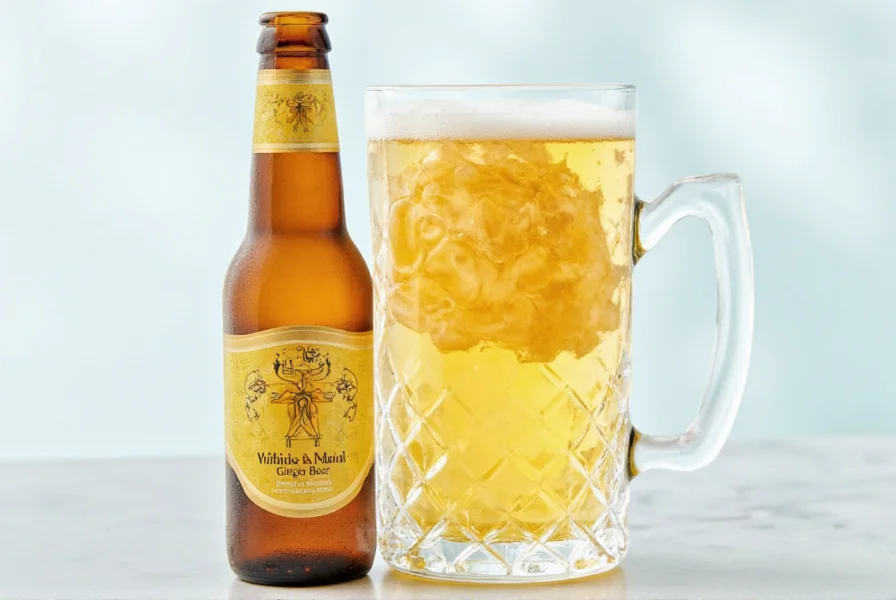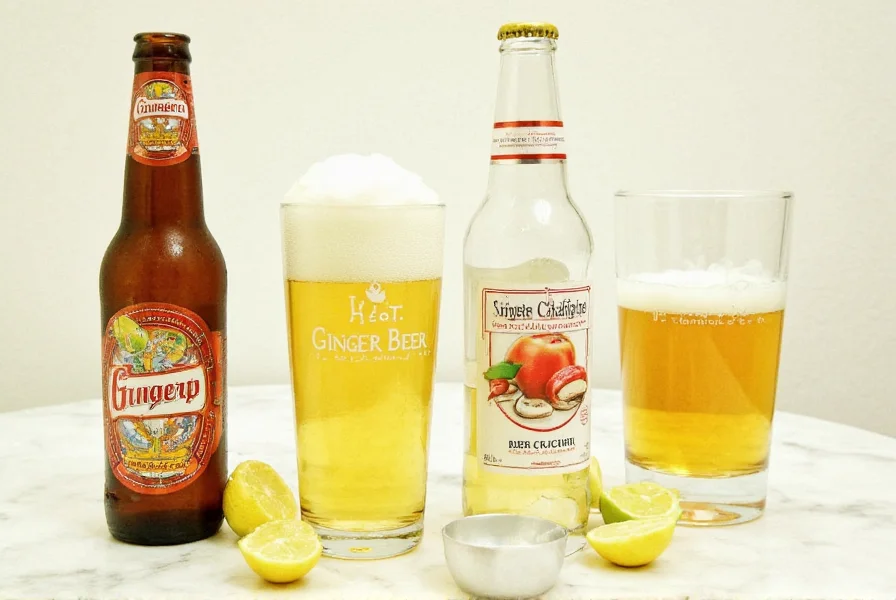Diet ginger beer has become increasingly popular among health-conscious consumers seeking flavorful beverages without the sugar load of traditional options. Unlike regular ginger beer which typically contains 25-40 grams of sugar per 12-ounce serving, diet versions deliver the distinctive spicy-sweet ginger flavor profile with minimal to no calories. This makes them particularly valuable for individuals managing diabetes, following low-carb or ketogenic diets, or simply reducing their sugar consumption without sacrificing taste.
What Makes Ginger Beer "Diet"
The primary difference between regular and diet ginger beer lies in the sweetening agents. Traditional ginger beer relies on sugar, honey, or high-fructose corn syrup to balance ginger's natural pungency. Diet versions replace these with various sugar alternatives that provide sweetness without significant calories:
- Artificial sweeteners: Aspartame, sucralose, acesulfame potassium
- Natural non-nutritive sweeteners: Stevia, monk fruit extract
- Sugar alcohols: Erythritol, xylitol (providing minimal calories)
These alternatives allow manufacturers to create ginger beer with less than 5 calories per serving while maintaining the characteristic ginger spice and carbonation. The ginger root content typically remains similar between regular and diet versions, preserving potential digestive benefits.
Health Considerations of Diet Ginger Beer
When evaluating whether diet ginger beer is a healthy choice, several factors come into play beyond just calorie content:
Ginger Content Benefits: Both regular and diet versions contain ginger root, which has been studied for its potential digestive benefits, anti-nausea properties, and anti-inflammatory effects. The ginger concentration generally remains consistent regardless of sweetener type.
Sweetener Safety: While artificial sweeteners remain controversial in some circles, major regulatory agencies including the FDA and EFSA have approved common sweeteners used in diet ginger beer at typical consumption levels. Natural options like stevia and monk fruit generally receive more favorable reception among health-conscious consumers.
Digestive Impact: Some people report that certain sugar alcohols (particularly sorbitol, though less common in ginger beer) can cause digestive discomfort when consumed in quantity. Erythritol, increasingly popular in diet beverages, tends to cause fewer gastrointestinal issues.
Dental Health: Unlike sugary beverages that contribute to tooth decay, diet ginger beer doesn't promote cavities since it lacks fermentable sugars that feed harmful oral bacteria.
| Sweetener Type | Calories per Serving | Glycemic Impact | Common Brands Using |
|---|---|---|---|
| Stevia/Monk Fruit | 0 | None | Reed's Zero Sugar, Q Mixers Diet |
| Erythritol | 0.2-0.8 | Minimal | Canada Dry Diet, Fever-Tree Light |
| Sucralose | 0 | None | Barritt's Diet, Bundaberg Sugar Free |
| Aspartame | 0 | None | Seagram's Diet Ginger Ale |
Popular Diet Ginger Beer Brands Compared
Not all sugar-free ginger beers deliver equal quality. The market offers various options with different approaches to achieving sweetness without sugar:
Natural Sweetener Options: Brands using stevia or monk fruit often appeal to consumers seeking more "clean label" products. These typically avoid artificial ingredients but may have a slightly different aftertaste compared to sugar-sweetened versions. Reed's Zero Sugar and Q Mixers Diet use organic ginger with natural sweeteners.
Traditional Brands' Diet Versions: Established ginger beer manufacturers like Canada Dry and Bundaberg offer diet versions that closely mimic their regular products' flavor profiles using artificial sweeteners. These often provide the most familiar taste for those transitioning from regular ginger beer.
Premium Craft Options: Higher-end brands like Fever-Tree Light and Fentimans Curiosity Cola (which includes ginger) use sophisticated sweetener blends to maintain complex flavor profiles while reducing sugar content.

How Diet Ginger Beer Is Made
The production process for diet ginger beer follows similar initial steps to traditional ginger beer but diverges at the sweetening stage:
- Ginger root is extracted to create the base flavor
- Additional botanicals like citrus peel or spices may be added
- The mixture is carbonated
- Instead of adding sugar syrup, sweetener solutions are incorporated
- Final flavor balancing occurs to compensate for taste differences from sugar
High-quality diet ginger beers focus on maintaining the ginger's authentic spicy character while minimizing any aftertaste from sweeteners. The best products achieve a flavor profile that closely resembles traditional ginger beer without the sugar crash or calorie load.
Using Diet Ginger Beer in Your Lifestyle
Diet ginger beer serves multiple purposes beyond just a standalone beverage:
Cocktail Mixing: It's an excellent low-calorie alternative in classic cocktails like Moscow Mules, Dark and Stormies, or Ginger Highballs. When substituting in recipes, use a 1:1 ratio with regular ginger beer.
Digestive Aid: Many people consume ginger beer specifically for its potential digestive benefits. Diet versions provide this benefit without the sugar that might otherwise exacerbate digestive issues for some individuals.
Keto and Low-Carb Diets: With most diet ginger beers containing less than 1g net carbohydrate per serving, they're compatible with strict ketogenic diets where regular ginger beer would exceed daily carb limits.
Diabetes Management: The absence of sugar and minimal impact on blood glucose makes diet ginger beer a safer choice for people with diabetes compared to regular versions.
Frequently Asked Questions
Does diet ginger beer contain real ginger?
Yes, most quality diet ginger beers contain real ginger root extract. The ginger content typically remains similar to regular versions, with the primary difference being the sweetener. Check ingredient lists for 'ginger root' or 'ginger extract' to confirm real ginger content.
Is diet ginger beer good for digestion?
Diet ginger beer can support digestion similarly to regular ginger beer because it contains ginger, which has natural compounds that may aid digestion. The absence of sugar might make it even better for some people's digestive systems, as excess sugar can sometimes cause bloating or discomfort.
Can I use diet ginger beer in cocktails instead of regular?
Yes, diet ginger beer works as a 1:1 substitute for regular ginger beer in cocktails like Moscow Mules or Dark and Stormies. The flavor profile is similar though some artificial sweeteners may alter the taste slightly. Premium brands with natural sweeteners typically provide the most seamless substitution.
Does diet ginger beer have any calories?
Most diet ginger beers contain 0-5 calories per 8-12 ounce serving, compared to 100-140 calories in regular ginger beer. Products sweetened with stevia or sucralose typically have 0 calories, while those using erythritol may have 0.2-0.8 calories per serving due to trace carbohydrates in the sugar alcohol.
Is diet ginger beer keto-friendly?
Yes, most diet ginger beers are keto-friendly as they contain less than 1g net carbohydrate per serving. Always check the nutrition label, as some brands may contain slightly higher carb counts. Those sweetened with erythritol or stevia generally have the lowest carb impact for strict keto diets.











 浙公网安备
33010002000092号
浙公网安备
33010002000092号 浙B2-20120091-4
浙B2-20120091-4